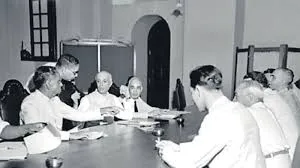The 1949 Karachi Agreement was conceived to still the guns in Kashmir, yet for years Islamabad has used it as diplomatic cover while tearing its core commitments to shreds. From Operation Gibraltar in 1965 to the Kargil heights in 1999 to thousands of cease-fire violations this century and the Pahalgam attack, Pakistan has habitually substituted proxy terror and military adventurism for the restraint it pledged, even as it lectures India on compliance.
A Pact Signed—and Immediately Undermined
On 27 July 1949 Indian and Pakistani commanders, under UN oversight, mapped an 830-kilometre cease-fire line designed to “establish peace and law and order” in Jammu & Kashmir. India treated the line as sacrosanct. Pakistan, within a generation, would weaponise it.
Operation Gibraltar: The 1965 Template for Duplicity
In August 1965, barely 16 years after Karachi, Pakistan inserted up to 30,000 irregulars and soldiers across the cease-fire line under the code-name Operation Gibraltar. The objective was explicit: ignite revolt, seize Srinagar radio, and invite Pakistani regulars to roll in. Local Kashmiris instead tipped off Indian troops, exposing the plot. Islamabad escalated to a full-blown war that engulfed Punjab, an undeniable violation of both the letter and spirit of Karachi.
Kargil 1999: Perfidy on the Peaks
Fast-forward to spring 1999. Even as Prime Ministers Atal Bihari Vajpayee and Nawaz Sharif exchanged peace vows in Lahore, Pakistan’s Northern Light Infantry crept over the line to occupy icy ridges overlooking the Leh-Srinagar highway. For weeks Islamabad claimed the intruders were “Kashmiri militants”. Twenty-five years later Army Chief General Asim Munir publicly admitted Pakistani regulars fought and died at Kargil. The confession highlights how systematically Pakistan lied while demanding international mediation against India’s counter-offensive.
Cease-fire Violations: A Drumbeat of Broken Words
Pakistan’s smaller skirmishes are no less revealing. The 2003 bilateral cease-fire was supposed to reinforce Karachi, yet 2020 alone recorded 5,100 Pakistani violations, the highest since the truce was proclaimed. That works out to 14 barrages every day, killing 36 people and injuring more than 130. Indian data obtained through Right-to-Information filings show 4,645 violations in 2020, dwarfing the single-digit figures of Karachi’s early years. When shelling tapered only after February 2021, Islamabad portrayed the lull as a concession, not the belated observance of a 70-year-old promise.
Proxy Terror: The Permanent Violation
More corrosive than artillery has been Pakistan’s state-sponsored jihad. Lashkar-e-Taiba, Jaish-e-Mohammed and allied outfits enjoy ISI shelter while staging attacks that openly defy the agreement’s mandate to “maintain peace and law and order”.
- Parliament, 13 December 2001: Five Pakistani gunmen stormed India’s legislature, killing nine and nearly decapitating the Union government. Home Minister L.K. Advani named Lashkar and Jaish as ISI proxies, calling the assault “the most audacious” act of Pakistan-backed terror.
- Mumbai, 26/11 2008: Ten Pakistani operatives murdered 166 people, including Americans and Israelis. Interrogator testimonies showed ISI handlers directing the strikes in real time—another grave breach of Karachi’s peace compact.
- Pulwama, 14 February 2019: A Jaish suicide bomber killed 40 CRPF troopers, the deadliest single attack on Indian forces in Kashmir14. Pakistan denied culpability even as the outfit’s chief, Masood Azhar, resurfaced on its soil.
- Pahalgam, 22 April 2025: Terrorists from The Resistance Front (TRF), a proxy for Lashkar-e-Taiba, killed 26 civilians, mostly Hindu tourists, in a targeted attack at Baisaran Valley, marking the deadliest strike on civilians in India since the 2008 Mumbai attack.
Each outrage prompts Islamabad to demand “dialogue” and “restraint”—diplomatic euphemisms for freezing Indian retaliation while Pakistan reloads.
The Secret 1949 “Azad Kashmir” Karachi Agreement
Pakistan’s two-track deceit runs deeper. A separate, confidential Karachi Agreement signed on 28 April 1949 quietly handed Islamabad control over Gilgit-Baltistan and key policy levers in so-called “Azad Kashmir”, erasing any veneer of local autonomy. The accord surfaced only in the 1990s during litigation in Pakistan-occupied Kashmir, laying bare how Islamabad carved up disputed territory while preaching plebiscites at the UN.
International Enablers and Double Standards
Western capitals often urge New Delhi to “de-escalate” after Pakistan-sponsored outrages, yet rarely condition aid to Islamabad on ending terror sanctuaries. US and European military assistance has flowed intermittently since the 1950s, furnishing the very jets that strike Indian positions after each flare-up. This indulgence incentivises Pakistan to treat agreements as reversible tactics rather than binding covenants.
India’s Strategic Patience Wearing Thin
New Delhi has repeatedly tested reconciliation, Simla 1972, Lahore 1999, Agra 2001, and the 2003 cease-fire. Each overture met sabotage: Kargil, Parliament, Mumbai, Pulwama, and Pahalgam. Prime Minister Narendra Modi’s government has responded with cross-LoC raids, the Balakot air-strike and most recently ‘Operation Sindoor’, signalling that future Karachi-style infractions will draw immediate kinetic costs. Yet India still refrains from abrogating the 1949 accord, hoping Pakistan might one day honour its own signature.
Final Thoughts
The Karachi Agreement is not a relic; it is a living indictment. Its clauses remain in force, but only one party acknowledges them. Pakistan’s record—Gibraltar, Grand Slam, Kargil, daily shelling, and a conveyor belt of jihadis shows serial contempt for the cease-fire it once signed under UN eyes. Islamabad’s recent call for India to “fully implement Karachi” rings hollow when the Pakistani state itself has converted Kashmir into the world’s longest-running proxy battlefield.
Peace will come not from fresh paper guarantees but from Pakistan’s first genuine fulfilment of the pledge it made on 27 July 1949, to stop crossing the line, in every sense of the phrase and stop sponsoring terrorism. Until then, the Karachi Agreement stands as a solemn document observed largely in its breach, a reminder that credibility, once squandered, is harder to reclaim than any frozen peak on the Line of Control.
Maj Gen. RPS Bhadauria (Retd) is the Additional Director General of the Centre for Land Warfare Studies (CLAWS), New Delhi, and was formerly the Director of the Centre for Strategic Studies & Simulation (CS3) at USI of India, having served in the Indian Army for 36 years.

